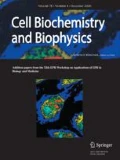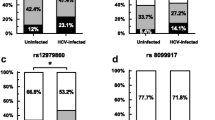Abstract
Hepatitis C virus (HCV) is a major cause of chronic liver disease, with about 170 million people infected worldwide. The standard regimen for treatment of HCV consists of a combination of pegylated interferon with ribavirin. Failure of interferon-α treatment in patients with chronic HCV infection remains a challenging obstacle. Both viral and host environmental factors have been implicated in reducing responsiveness to IFN-α therapy. Host genetic diversity is also believed to contribute to the different clinical outcomes in HCV infection. The objective of the study was to investigate the association of both IL-10 (−819 and −592) and MxA (−88 and −123) single-nucleotide polymorphisms (SNPs) of the promoter regions, with response to interferon (IFN) therapy in Egyptian patients infected with HCV genotype 4. Polymorphisms of both genes in 85 HCV patients and 100 controls were determined by polymerase chain reaction–restriction fragment length polymorphism (PCR–RFLP) technique. The frequency of SNP was compared between sustained responders (n = 52) and non-responders (n = 33), as determined by biochemical and virological response to IFN and ribavirin combined therapy. The frequency of the −819T/T and the −592A/A genotypes of IL-10 was significantly higher among responders compared to non-responders (51.92 vs 39.4 %, P = 0.03; 51.92 vs 42.42 %;P = 0.046 respectively). The G/G genotype at position −88 of the MxA gene was significantly lower in responders than in non-responders (25 vs 75.76 %, P = 0.046), whereas heterozygotes (G/T) were more likely responders (65.38 vs 18.18 %, P = 0). The −123C/A genotype was significantly associated with responders (48.08 vs 30.30 %, P = 0.014). Findings suggest that homozygosity for both −819T/T and −592A/A polymorphisms of IL-10 gene and that heterozygosity for both −88G/T and −123C/A polymorphisms of the MxA gene are important host factors that influence the response to IFN therapy in patients with chronic HCV infection.

Similar content being viewed by others
Abbreviations
- ALT:
-
Alanine aminotransferase
- CTL:
-
Cytotoxic T lymphocytes
- HCV:
-
Hepatitis C virus
- IFN:
-
Interferon
- IL:
-
Interleukin
- ISRE:
-
Interferon-stimulated response elements
- MxA:
-
Myxovirus resistance A
- NR:
-
Non-responders
- OAS:
-
Oligoadenylate synthetase
- PCR:
-
Polymerase chain reaction
- PEG:
-
Pegylated
- PKR:
-
dsRNA-activated protein kinase
- RFLP:
-
Restriction fragment length polymorphism
- STAT:
-
Signal transducer and activator of transcription
- SNP:
-
Single-nucleotide polymorphism
- SOC:
-
Standard of care
- SOCS:
-
Suppressor of cytokine signaling
- SR:
-
Sustained responders
- SVR:
-
Sustained virological response
References
Mancini, N., Diotti, R., Perotti, M., Sautto, G., Clementi, N., Nitti, G., et al. (2010). Hepatitis C Virus (HCV) infection may elicit neutralizing antibodies targeting epitopes conserved in all viral genotypes. PLoS One, 4(12), e8254.
Asselah, T., Estrabaud, E., Bieche, I., Lapalus, M., De Muynck, S., Vidaud, M., et al. (2010). Hepatitis C: viral and host factors associated with non-response to pegylated interferon plus ribavirin. Liver International, 30, 1259–1269.
Miller, F. D., & Abu-Raddad, L. J. (2010). Evidence of intense ongoing endemic transmission of hepatitis C virus in Egypt. Proceedings of the National Academy of Sciences of the United States of America, 107(33), 14757–14762.
Yeh, S. H., Chen, D. S., & Chen, P. J. (2003). A prospect for pharmacogenomics in the interferon therapy of chronic viral hepatitis. Journal of Antimicrobial Chemotherapy, 52, 149–151.
Abbas, O., Abdel-Rahman, M., Omar, N., Badran, H., & Amir, E. (2009). Interleukin-10 promoter polymorphisms in hepatitis C patients with and without Schistosoma mansoni co-infection. Liver International, 9(29), 1422–1430.
Edwards-Smith, C., Jonsson, J. R., Purdie, D., Bansal, A., Shorthouse, C., & Powell, E. E. (1999). Interleukin-10 promoter polymorphism predicts initial response of chronic hepatitis C to interferon alpha. Hepatology, 30, 526–530.
Knapp, S., Yee, L. J., Frodsham, A. J., Hennig, B. J. W., Hellier, S., Zhang, L., et al. (2003). Polymorphisms in interferon-induced genes and the outcome of hepatitis C virus infection: Roles of MxA, OAS-1 and PKR. Genes and Immunity, 4, 411–419.
Suzuki, F., Arase, Y., Suzuki, Y., Tsubota, A., Akuta, N., Hosaka, T., et al. (2004). Single nucleotide polymorphism of the MxA gene promoter influences the response to interferon monotherapy in patients with hepatitis C viral infection. Journal of Viral Hepatitis, 11(3), 271–276.
Hijikata, M., Ohta, Y., & Mishiro, S. (2000). Identification of a single nucleotide polymorphism in the MxA gene promoter (G/T at nt −88) correlated with the response of hepatitis C patients to interferon. Intervirology, 43, 124–127.
Hijikata, M., Mishiro, S., Miyamoto, C., Furuichi, Y., Hashimoto, M., & Ohta, Y. (2001). Genetic polymorphism of the MxA gene promoter and interferon responsiveness of hepatitis C patients: Revisited by analyzing two SNP sites (−123 and −88) in vivo and in vitro. Intervirology, 44, 379–382.
Sadler, A., & Williams, B. (2008). Interferon-inducible antiviral effectors. Nature Reviews Immunology, 8, 559–568.
Pineda, J. A., Caruz, A., Rivero, A., Neukan, K., & Salas, I. (2010). Prediction of response to pegylated interferon plus ribavirin by IL28B gene variation in patients coinfected with HIV and hepatitis C virus. Clinical Infectious Diseases, 51, 788–795.
Nattermann, J., Vogel, M., Nischalke, H. D., Danta, M., Mauss, S., Stellbrink, H. J., et al. (2011). Genetic variation in IL28B and treatment-induced clearance of hepatitis C virus in HIV-positive patients with acute and chronic hepatitis C. Journal of Infectious Diseases, 203, 595–601.
Gao, B., Hong, F., & Radaeva, S. (2004). Host factors and failure of interferon-alpha treatment in hepatitis C virus. Hepatology, 39, 880–890.
Barnes, E., Webster, G., Whalley, S., & Dusheiko, G. (1999). Predictors of a favorable response to alpha interferon therapy for hepatitis C. Clinics in Liver Disease, 3(4), 775–791.
Saludes, V., Bracho, M. A., Valero, O., Ardèvol, M., Planas, R., González-Candelas, F., et al. (2010). Baseline prediction of combination therapy outcome in hepatitis C virus 1b infected patients by discriminant analysis using viral and host factors. PLoS One, 5(11), e14132.
Yee, L. J., Tang, J., Gibson, A. W., Kimberly, R., Van Leeuwen, D. J., & Kaslow, R. A. (2001). Interleukin-10 polymorphisms as predictors of sustained response in antiviral therapy for chronic hepatitis C infection. Hepatology, 33, 708–712.
Shaker, O. G., & Sadik, N. A. (2012). Polymorphisms in interleukin-10 and interleukin-28B genes in Egyptian patients with chronic hepatitis C virus genotype 4 and their effect on the response to pegylated interferon/ribavirin-therapy. Journal of Gastroenterology and Hepatology, 27(12), 1842–1849.
Shaker, O. G., Nassar, Y. H., Nour, Z. A., & El Raziky, M. (2013). Single-nucleotide polymorphisms of IL-10 and IL-28B as predictors of the response of IFN therapy in HCV genotype 4-infected children. Journal of Pediatric Gastroenterology and Nutrition, 57(2), 155–160.
Kusumoto, K., Uto, H., Hayashi, K., Takahama, Y., Nakao, H., Suruki, R., et al. (2006). Interleukin-10 or tumor necrosis factor-α polymorphisms and the natural course of hepatitis C virus infection in a hyperendemic area of Japan. Cytokine, 34, 24–31.
Pereira, F. A., da Silva, N. N., Rodart, I. F., Carmo, T. M., Lemaire, D. C., & Reis, M. G. (2008). Association of TGF-β1 codon 25 (G915C) polymorphism with hepatitis C virus infection. Journal of Medical Virology, 80, 58–64.
Chuang, J. Y., Yang, S. S., Lu, Y. T., Hsieh, Y. Y., Chen, C. Y., Chang, S. C., et al. (2009). IL-10 promoter gene polymorphisms and sustained response to combination therapy in Taiwanese chronic hepatitis C patients. Digest Liver Diseases, 6(41), 424–430.
Cramp, M., Rossol, S., Chokshi, S., Carucci, P., Williams, R., & Naoumov, N. (2000). Hepatitis C virus-specific T-cell reactivity during interferon and ribavirin treatment in chronic hepatitis C. Gastroenterology, 118, 346–355.
Bengsch, B., Thimme, R., & Blum, H. E. (2009). Role of host genetic factors in the outcome of hepatitis C virus infection. Viruses, 1(2), 104–125.
Shen, X., Hong, F., Nguyen, V. A., & Gao, B. (2000). IL-10 attenuates interferon-alpha-activated STAT1 in the liver: Involvement of SOCS2 and SOCS3. FEBS Letters, 480, 132–136.
Hale, B., Albrecht, R., & García-Sastre, A. (2010). Innate immune evasion strategies of influenza viruses: Host innate immune response to infection. Future Microbiology, 5(1), 23–41.
Ito, S., Ansari, P., Sakatsume, M., Dickensheets, H., Vazquez, N., Donnelly, R. P., et al. (1999). Interleukin-10 inhibits expression of both interferon alpha-and interferon gamma-induced genes by suppressing tyrosine phosphorylation of STAT1. Blood, 93, 1456.
Martin-Blondel, G., Gales, A., Bernad, J., Cuzin, L., Delobel, P., Barange, K., et al. (2009). Low interleukin-10 production by monocytes of patients with a self-limiting hepatitis C virus infection. Journal of Viral Hepatitis, 16, 485–491.
Fernández-Arcás, N., Blanco, A., Gaitán, M. J., Nyqvist, M., Alonso, A., & Reyes-Engel, A. (2004). Differential transcriptional expression of the polymorphic myxovirus resistance protein A in response to interferon alpha treatment. Pharmacogenetics, 14(3), 189–193.
Huang, Y. X., Ma, L. N., Chen, X. Y., Huang, Y. L., Shen, C. L., & Ma, B. (2008). Genetic polymorphisms of MxA protein and eIF-2a-reg2 and their responses to interferon treatment. ZHGZ, 15, 187–191.
Maouzi, A., Wietzke-Braun, P., Mänhardt, L. B., Ramadori, G., & Mihm, S. (2005). Analysis of a single nucleotide polymorphism in the promoter of the MxA gene in patients with spontaneous and treatment induced recovery from hepatitis C virus infection. Zeitschrift fur Gastroenterologie, 43, 271–275.
Welzel, T., Morgan, T., Bonkovsky, H., Naishadham, D., Pfeiffer, R., Wright, E., et al. (2009). Variants in interferon-alpha pathway genes and response to pegylated interferon-alpha 2a plus ribavirin for treatment of chronic hepatitis C virus infection in the hepatitis C antiviral long-term treatment against cirrhosis trial. Hepatology, 49, 1847–1858.
Mohamed, M., Sabet, S., Moustafa, M., & Salama, M. (2011). Correlation between a single nucleotide polymorphism (G/T at nt −88) in the Mx1 gene promoter and the response to interferon therapy for hepatitis C virus in Egyptian patients. African Journal of Biotechnology, 10(62), 13376–13382.
Nakade, K., Honda, H., & Nagata, K. (1997). Promoter structure of the MxA gene that confers resistance to influenza virus. FEBS Letters, 418, 315–318.
Shaker, O., Rashad, A., Aziz, GA., Raziky, ME.(2014). Is rs8099917 polymorphism of IL-28B gene a good predictor of response to therapy of HCV than rs12979860? An Egyptian study. Cell Biochem Biophysics. [in press].
Shaker, O., El-Shehaby, A., Fayez, S., Zahra, A., Marzouk, S., & El Raziky, M. (2013). Osteopontin gene polymorphisms as predictors for the efficacy of interferon therapy in chronic hepatitis C Egyptian patients with genotype 4. Cell Biochemistry and Function, 31(7), 620–625.
Acknowledgments
This work was supported by the Egyptian Science and Technology Development Fund [Project Number 1512 to PI; Olfat Shaker]. The author(s) received no financial support for the research and/or authorship of this article.
Author information
Authors and Affiliations
Corresponding author
Additional information
Olfat G. Shaker, Mohamed T. Abdel-Rahim, Salma T. Bayoumi have contributed to the work; all authors have agreed to submit the manuscript for publication , and all human studies have been reviewed by the appropriate ethics committees.
Rights and permissions
About this article
Cite this article
Shaker, O.G., Abdel-Rahim, M.T. & Bayoumi, S.T. Gene Polymorphisms of IL-10 and MxA in Responders and Non-responders to Interferon Therapy in HCV Egyptian Patients Genotype 4. Cell Biochem Biophys 71, 617–625 (2015). https://doi.org/10.1007/s12013-014-0241-9
Published:
Issue Date:
DOI: https://doi.org/10.1007/s12013-014-0241-9




